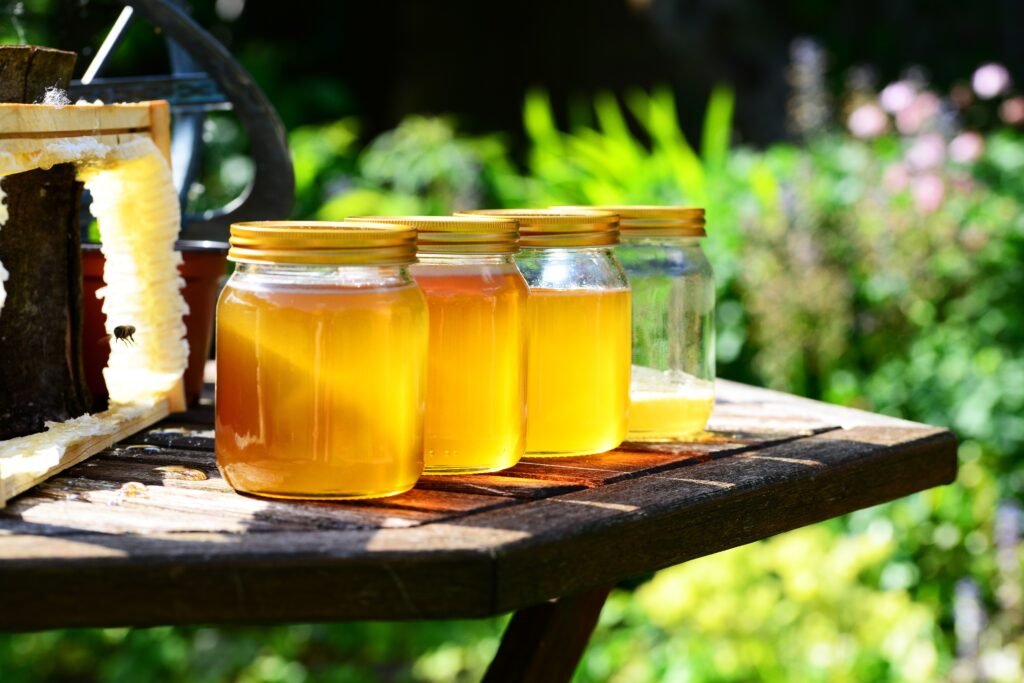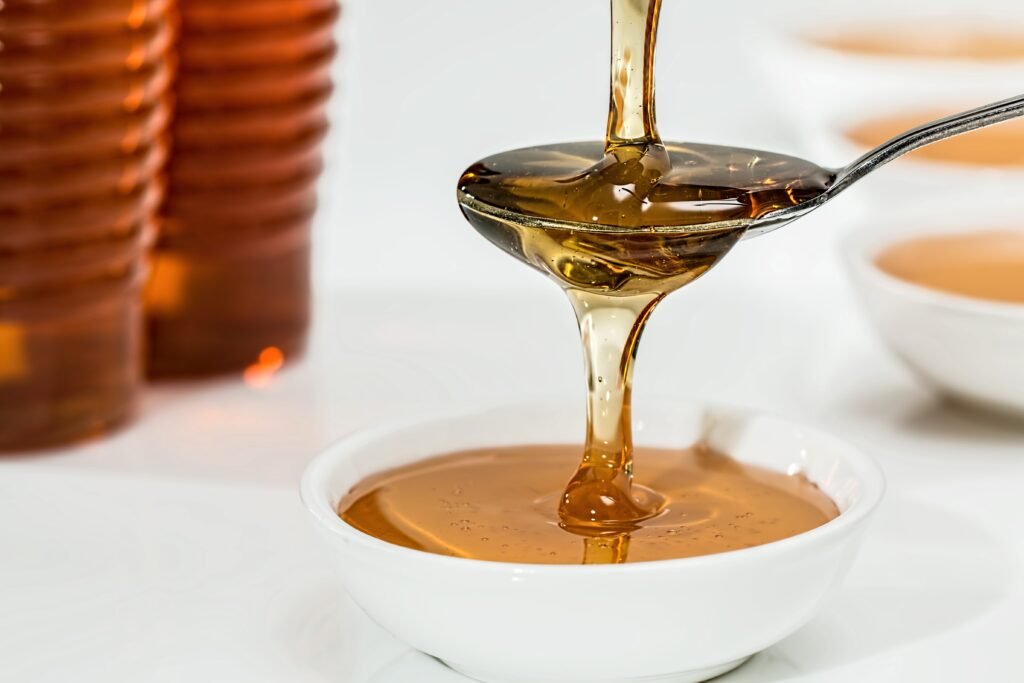
Honey: Nature’s Golden Elixir for Health and Wellness
Introduction
Prepare to be enchanted by honey—an exquisite fusion of decadence and health benefits. For centuries, this golden elixir has captivated cultures worldwide, celebrated not only for its sweet taste but also for its remarkable medicinal properties. In this exploration, we delve into six captivating reasons why honey deserves its esteemed status as a natural wonder.
Six Fascinating Health Benefits of Honey
1. Antioxidant Richness
Honey flows with potent currents of flavonoids and phenolic acids, safeguarding your body’s cells from harmful free radicals. By reducing oxidative stress, honey helps prevent various illnesses, including heart disease, certain cancers, and diabetes .
Flavonoids and Phenolic Acids: These compounds have been extensively studied for their antioxidant properties. According to a study published in the Journal of Agricultural and Food Chemistry, the antioxidant capacity of honey can vary depending on its floral source and geographical origin, but it consistently provides significant protection against oxidative damage .
Preventing Chronic Diseases: The antioxidants in honey neutralize free radicals, reducing the risk of chronic diseases. Research from the Journal of Medicinal Food indicates that regular consumption of honey can lower the risk of cardiovascular disease and certain cancers by mitigating oxidative stress .
2. Immune Support
Beyond its role as a free-radical scavenger, honey acts as an antimicrobial agent, bolstering immune defenses. Its myriad benefits make honey a safe and effective means of preventing infections, reducing inflammation, and supporting overall wellness year-round .
Antimicrobial Properties: Honey contains hydrogen peroxide, methylglyoxal, and other compounds that give it strong antibacterial properties. A study from the Iranian Journal of Basic Medical Sciences highlights honey’s effectiveness against a wide range of pathogens, making it a natural remedy for fighting infections .
Anti-inflammatory Effects: Honey’s anti-inflammatory properties help reduce swelling and promote healing. Research in the Journal of Medicinal Food suggests that honey can modulate immune responses, making it beneficial for preventing and managing inflammatory conditions .
3. Digestive Health
Honey’s enzyme composition and prebiotic qualities make it a gentle yet highly effective digestive aid. Whether consumed alone, mixed with fluids, or baked into foods, honey soothes indigestion and promotes regular gastrointestinal function .
Enzymes and Prebiotics: Honey contains enzymes like glucose oxidase, which aids in digestion, and prebiotics, which support healthy gut bacteria. The Journal of Agricultural and Food Chemistry reports that these components improve gut health and enhance digestion .
Relieving Digestive Issues: Honey’s soothing effect on the digestive tract can help alleviate symptoms of acid reflux, ulcers, and irritable bowel syndrome (IBS). A study published in the Journal of Medicinal Food found that honey can reduce gastric acidity and enhance mucosal defense mechanisms, providing relief for those with digestive disorders .
4. Energy Source
In need of a natural energy boost? Look no further than honey. Packed with carbohydrates—glucose and fructose—honey is perfect for sustaining energy levels, whether as a pre-workout snack or a midday pick-me-up .
Glucose and Fructose: These simple sugars in honey are easily absorbed by the body, providing a quick source of energy. According to research in the Journal of the International Society of Sports Nutrition, honey’s carbohydrate content makes it an excellent choice for athletes looking to replenish glycogen stores during intense workouts .
Sustained Energy Release: Unlike processed sugars, honey provides a balanced release of energy, preventing spikes and crashes. A study from the European Journal of Clinical Nutrition indicates that honey’s combination of glucose and fructose allows for sustained energy levels throughout the day .
5. Wound Healing Properties
For centuries, honey has been used topically to treat wounds and burns, thanks to its antibacterial and anti-inflammatory properties. It stimulates healing, reduces swelling, and prevents contamination, making it a must-have in every first aid kit .
Healing Mechanisms: Honey promotes wound healing by maintaining a moist environment, enhancing tissue regeneration, and preventing bacterial growth. A comprehensive review in the Journal of Dermatological Treatment highlights honey’s effectiveness in accelerating wound healing and reducing infection rates .
Clinical Applications: Medical-grade honey, such as Manuka honey, is widely used in clinical settings for treating burns, ulcers, and surgical wounds. A study published in the Journal of Wound Care found that Manuka honey significantly reduced healing time and improved outcomes in patients with chronic wounds .
6. Skin Savior
Honey isn’t just beneficial internally—it works wonders for your skin too! Applied topically, honey moisturizes, soothes, and nourishes, serving as a natural remedy for acne, eczema, and other skin conditions, revealing a radiant complexion .
Moisturizing and Healing Properties: Honey acts as a natural humectant, drawing moisture into the skin. The Journal of Cosmetic Dermatology reports that honey can improve skin hydration, elasticity, and texture, making it a popular ingredient in skincare products .
Treating Skin Conditions: Honey’s antimicrobial and anti-inflammatory effects make it effective in managing acne and eczema. A study from the Journal of Drugs in Dermatology demonstrates honey’s ability to reduce acne lesions and soothe irritated skin, promoting a clear and healthy complexion .
Potential Drawbacks and Considerations
While honey offers numerous health benefits, it’s essential to be aware of potential drawbacks and considerations:
Sugar Content: Honey is high in natural sugars and should be consumed in moderation, especially by individuals with diabetes or those monitoring their sugar intake .
Allergic Reactions: Some individuals may be allergic to honey or pollen residues present in it. It’s crucial to exercise caution and consult a healthcare professional if you have known allergies .
Incorporating Honey Into Your Life
From sunrise to sunset, there are countless ways to embrace the health benefits of honey:
Choosing Quality Honey: Opt for raw or unprocessed honey, which retains its natural enzymes, antioxidants, and nutrients. Look for trusted sources or local beekeepers to ensure quality and authenticity .
Culinary Uses: Use honey as a natural sweetener in beverages, smoothies, and baked goods. Drizzle it over yogurt, toast, or oatmeal for a delicious and nutritious start to your day .
DIY Remedies: Incorporate honey into homemade face masks and hair treatments for its moisturizing and soothing properties. Its versatility makes it a valuable addition to any beauty routine .
Conclusion
With its antioxidant prowess, immune-boosting properties, and versatility, honey truly is nature’s sweet secret to well-being and joy. Embrace the golden goodness of honey in your daily rituals and relish the rewards of a vibrant life. Whether enjoyed for its rich flavor, therapeutic benefits, or culinary versatility, honey continues to prove its worth as a timeless and invaluable natural remedy.
References
- Bogdanov S, Jurendic T, Sieber R, Gallmann P. “Honey for nutrition and health: a review.” J Am Coll Nutr. 2008;27(6):677-689. Link
- Eteraf-Oskouei T, Najafi M. “Traditional and modern uses of natural honey in human diseases: a review.” Iran J Basic Med Sci. 2013;16(6):731-742. Link
- National Honey Board. “Honey: Health and Nutritional Benefits.” Available at: Link
- Vallianou NG, Gounari P, Skourtis A, Panagos J, Kazazis C. “Honey and its anti-inflammatory, anti-bacterial and anti-oxidant properties.” Gen Med (Los Angeles). 2014;2:132. Link
- Burlando B, Cornara L. “Honey in dermatology and skin care: a review.” J Cosmet Dermatol. 2013;12(4):306-313. Link
- Al-Mamary M, Al-Meeri A, Al-Habori M. “Antioxidant activities and total phenolics of different types of honey.” Nutr Res. 2002;22(9):1041-1047. Link
- Khalil MI, Sulaiman SA, Boukraa L. “Antioxidant properties of honey and its role in preventing health disorders.” Open Nutraceuticals J. 2010;3(1). Link

